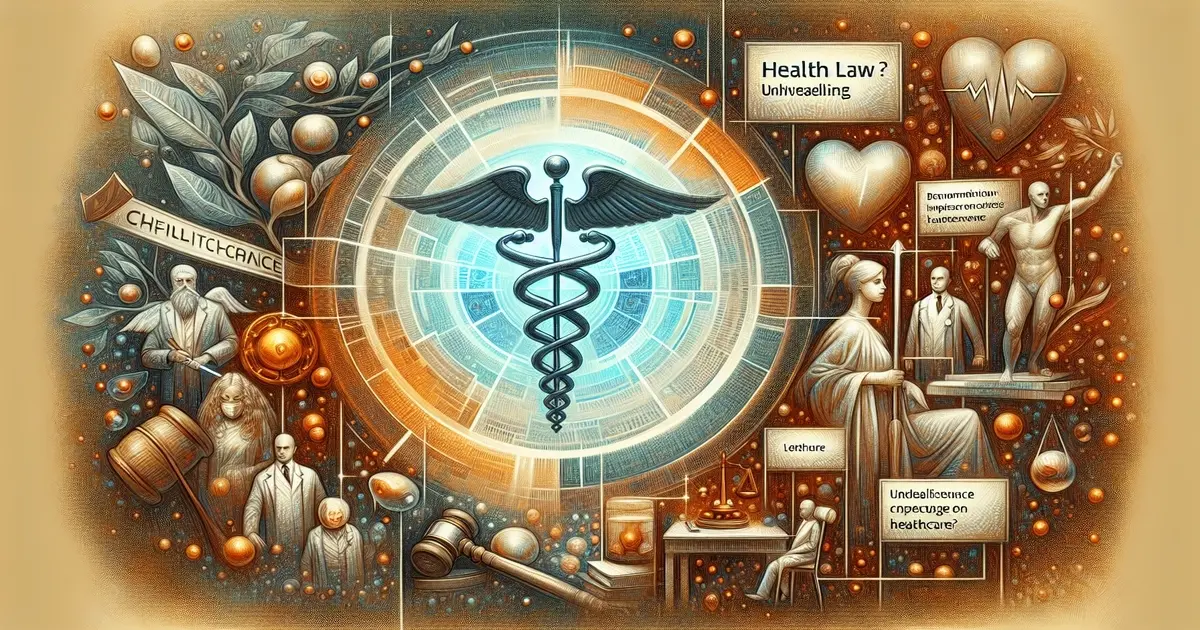Health Law: Unveiling Its Impact on Healthcare
Have you ever wondered how courses and laws shape healthcare, protect patient rights, uphold medical ethics, and how people and experts contribute to this process? Welcome to the world of health law, a crucial yet often misunderstood field that profoundly impacts our lives. This realm isn't just about regulations; it's about safeguarding quality care and navigating the complex intersection between legal frameworks and medical practices.
Understanding health law is essential whether you're a healthcare professional, a legal expert, or simply someone curious about how laws influence health policies and personal health decisions. Dive into the intricacies of the health system, a fascinating area, as we explore its significance, challenges, and pivotal role in our society today, especially for future healthcare lawyers and tax law.
Table Of Contents
Key Takeaways
- Health law is a specialized field encompassing a wide range of legal issues, from healthcare delivery to insurance and patient rights, making it essential for professionals and patients alike to understand its scope and implications.
- Key components of health legislation include patient privacy, healthcare access, and regulation of medical professionals, which aim to ensure the safety and fairness of healthcare delivery.
- Healthcare providers must navigate complex legal requirements to maintain compliance and avoid malpractice, highlighting the importance of legal expertise in the medical field.
- Health lawyers play a crucial role in advising on legal obligations, defending against litigation, and shaping healthcare policy, demonstrating the need for specialized legal knowledge in health law.
- Understanding the intricacies of malpractice, insurance, compliance, and fraud prevention is vital for healthcare professionals to protect their practices and advocate for patient rights effectively.
- Choosing the right educational program is crucial for those interested in pursuing a career in health law to gain the knowledge and skills needed to succeed in this challenging and rewarding field.
Defining Health Law
Legal Framework
Health law encompasses federal, state, and local regulations governing the intricate web of healthcare provision. It sets the stage for how healthcare providers, payers, and vendors operate within the legal confines. This framework ensures that the delivery of healthcare services adheres to established standards and ethical guidelines.
The scope of health law includes legislative, executive, and judicial oversight. These layers of governance provide a structured approach to managing the complexities of the healthcare industry. They ensure policies are enacted, fairly enforced, and adjudicated by future healthcare lawyers.
Key Stakeholders
Health law impacts a wide array of entities within the healthcare sector. Hospitals, insurance companies, pharmaceutical firms, and individual practitioners navigate this regulatory maze, a task for future healthcare lawyers. Each stakeholder must comply with laws to protect patient rights and promote fair practices.
For instance, regulations like HIPAA (the Health Insurance Portability and Accountability Act) safeguard patient privacy. Similarly, the Anti-Kickback Statute aims to prevent financial incentives from influencing medical decisions. These rules underscore the importance of maintaining ethical standards across all facets of healthcare.
Ethical Considerations
At its core, health law intertwines with professional ethics and patient rights. It addresses critical issues such as informed consent and involuntary medical treatment, upholding individuals' autonomy over medical care decisions while ensuring accountability among healthcare providers.
This field distinctly differs from medical law, focusing more on medical professionals' prerogatives and patient rights. Furthermore, it is separate from medical jurisprudence, a branch of medicine that applies medical knowledge to legal problems and proceedings.
Public Health Impact
Public health law is a significant component of health law. It concentrates on the government's role in enhancing public health through authority use within societal norms. This area examines legal measures' effects on public health outcomes, aiming to improve the general population's well-being.

Critical Components of Health Legislation
Stark Law
The Stark Law prevents conflicts of interest within the healthcare sector. It prohibits physicians from referring patients to entities with which they have a financial relationship. This law ensures that medical decisions are based on patient needs, not monetary gain.
Physicians must navigate these regulations carefully to avoid severe penalties. They often require legal counsel to maintain compliance, highlighting the complexity of health legislation.
EMTALA
EMTALA, or the Emergency Medical Treatment and Labor Act, guarantees equitable access to emergency services regardless of a patient's ability to pay. This federal law mandates that hospitals with emergency departments provide an appropriate medical screening examination to anyone requesting care for a potential emergency medical condition.
Hospitals must stabilize patients with emergencies before any transfer or discharge. EMTALA ensures no one is denied critical care in urgent situations, embodying the principle that access to health care should be a right, not a privilege.
Privacy Laws
State-specific privacy laws protect patient information rigorously. These laws complement federal regulations like HIPAA (Health Insurance Portability and Accountability Act), providing layers of security around personal health data.
Patients have rights over their health information, including obtaining and reviewing their records and requesting corrections. These laws empower patients, ensuring they are informed participants in their care.
Patient Consent
Informed consent is another cornerstone of health legislation. Before proceeding, patients must be fully aware of the risks and benefits associated with treatments. This process respects patient autonomy and supports ethical medical practice.
Healthcare providers must communicate effectively and document consent meticulously. This protects both parties if disputes arise about the care provided.
Impact on Healthcare Providers
Operations Impact
Health law profoundly influences how hospitals and other healthcare providers operate daily. These entities must navigate a complex web of regulations that dictate everything from patient care standards to billing practices. For healthcare providers, this means dedicating substantial resources to compliance departments and training programs.
They must ensure all staff are up-to-date on the latest health laws. This requirement often increases operational costs but is essential for providing safe and effective medical care. Failure to comply can result in severe penalties, including fines and loss of licensure.
Policy Changes
Introducing new health laws frequently forces healthcare providers to adjust their policies and procedures. These adjustments must align with legal requirements and protect patients' rights. For instance, laws related to patient privacy demand strict controls over how individual health information is stored and shared.
Providers must constantly review and update their policies to remain compliant. This ongoing process can be challenging, especially for smaller practices with limited administrative support. Yet, it's crucial for maintaining trust between healthcare providers and their clients.
Compliance Challenges
Complying with health law is no small feat for healthcare providers. They face numerous challenges, including understanding the intricacies of the law, implementing required changes within tight deadlines, and ensuring continuous compliance amidst evolving regulations.
These challenges are compounded by the need to balance legal obligations with providing high-quality medical care to patients. Healthcare providers must navigate these complexities carefully to avoid penalties while fulfilling their primary mission of caring for individuals.
Non-Compliance Consequences
The consequences of non-compliance with health law can be dire for healthcare providers. Penalties range from financial fines to more severe actions like suspension or revocation of licenses. Legal action may also be taken against providers, resulting in costly lawsuits that can harm reputations and financial stability.
Moreover, non-compliance risks patient safety and undermines public trust in the health system. No provider wants to face this situation, underscoring the importance of diligent adherence to health laws.
Role of Health Lawyers
Corporate Matters
Health lawyers are crucial in guiding healthcare providers through complex corporate matters. They help draft and review contracts, ensuring all agreements comply with relevant laws and regulations. This includes mergers, acquisitions, and partnerships within the healthcare sector.
They also advise on corporate governance issues, helping institutions operate within legal frameworks. Their expertise is vital in navigating the intricacies of healthcare law and protecting organizations from potential legal pitfalls.
Litigation Support
In litigation, health lawyers defend healthcare providers against lawsuits. These may range from malpractice claims to disputes over contracts. They work tirelessly to safeguard the interests of their clients, employing a deep understanding of law and medicine.
These professionals are adept at managing cases efficiently, minimizing financial and reputational damage to healthcare providers. Their strategic guidance is indispensable in resolving conflicts favorably for their clients.
Regulatory Compliance
Another critical responsibility of health lawyers is navigating the maze of healthcare regulations. They ensure that healthcare providers comply with laws about patient care, privacy, and data security. This includes advising on the Health Insurance Portability and Accountability Act (HIPAA) and other regulatory requirements.
Their advisory role is critical in avoiding violations that can lead to fines or sanctions. By staying abreast of legislative changes, health lawyers help providers adapt their practices accordingly, fostering an environment of compliance.
Fraud and Abuse Prevention
Health lawyers are instrumental in preventing fraud and abuse within the healthcare system. They guide providers in implementing policies that deter unethical behavior. This encompasses advice on billing practices to avoid accusations of fraud or abuse.
Their preventive measures protect institutions from legal scrutiny while promoting integrity within the healthcare system. Health lawyers' expertise ensures providers can offer services without compromising ethical standards.
Risk Management
Effective risk management is another area where health lawyers excel. They identify potential risks associated with clinical operations and offer strategies to mitigate these threats. Their insights are invaluable in maintaining patient safety and avoiding legal complications.
Health lawyers also play a pivotal role in ethical decision-making within healthcare settings. They clarify ethical dilemmas and ensure decisions align with legal obligations and moral principles.
Navigating Malpractice and Insurance
Legal Disputes
Health law plays a pivotal role in medical malpractice claims. It outlines the standards for care that health providers must follow. When these standards are not met, patients may file claims. Health lawyers guide providers through this complex process.
They help gather evidence and develop defense strategies. Their expertise is crucial in proving that the care met legal standards. This reduces the risk of costly settlements.
Insurance Policies
Health law also governs the relationship between healthcare providers and insurance companies. It affects coverage disputes and reimbursement issues. Providers often face challenges with insurers over what treatments are covered.
Lawyers navigate these disputes, ensuring providers receive fair compensation. They advocate for clear policies that cover essential treatments. This helps avoid financial losses for both parties.
Malpractice Litigation
In malpractice litigation, health lawyers defend providers against claims of negligence. They use detailed knowledge of health law to challenge allegations. Their goal is to demonstrate that the provider's actions were within the scope of standard care.
A successful defense can prevent damage to a provider's reputation and financial stability. Lawyers work tirelessly to protect their client's interests in court.
Insurance Negotiations
Health lawyers also assist in insurance negotiations. They strive for agreements that benefit healthcare providers, including negotiating better rates and coverage terms.
Their negotiation skills ensure that contracts are fair and support quality patient care. This is vital for maintaining a stable healthcare practice.
Compliance and Fraud Prevention
Regulatory Measures
Regulatory compliance stands as a cornerstone in the healthcare industry. It ensures that organizations adhere to federal and state laws designed to protect patient information, uphold civil rights, and prevent fraud. These measures are crucial for maintaining trust and integrity within the health sector.
Healthcare entities implement comprehensive compliance programs to navigate these regulations effectively. Such programs include regular audits, employee training, and strict privacy policies. They aim to identify potential risks of fraud and abuse early on. This proactive approach safeguards patient data and protects organizations from legal repercussions.
Legal Advocacy
Health lawyers are pivotal in advocating for more robust health laws and regulations. They work tirelessly to address instances of non-compliance and abuse within the system. Their expertise in tax law, civil rights, and regulatory compliance is invaluable.
These professionals often collaborate with business associations, advocacy groups, and government agencies. Together, they push for reforms that enhance access to quality health care while preventing fraudulent practices. Health lawyers also guide healthcare entities in improving their compliance efforts.
Fraud Detection
Detecting fraud within the health care system requires vigilance and sophisticated strategies. Health organizations employ various tools and technologies to monitor transactions for signs of abuse or irregularities. These efforts are critical in identifying fraudulent billing practices or unauthorized access to patient information.
Legal teams then investigate these alerts thoroughly. They work alongside federal agencies like the Department of Health and Human Services (HHS) when necessary. Successful investigations can lead to significant recoveries for the healthcare system, deterring future attempts at fraud.

Career Paths in Health Law
Law Firms
Law firms specializing in health law offer a variety of career opportunities for future healthcare lawyers. These firms seek individuals with a deep understanding of health-related regulations and policies. Lawyers in these settings provide counsel on compliance, engage in litigation, and advise on transactions. Their clients often include hospitals, pharmaceutical companies, and insurance providers.
A strong background in both legal and healthcare systems is crucial. Success in this environment demands excellent research, negotiation, and communication skills.
In-House Counsel
Healthcare organizations frequently employ in-house counsel to navigate the complex legal landscape. These professionals ensure compliance with health laws and regulations that directly affect their organizations. They work closely with management teams to mitigate risk and guide strategic decisions.
In-house counsel roles require a comprehensive knowledge of health law. They also demand the ability to work well under pressure and provide clear advice on complicated issues.
Government Agencies
Government agencies at federal, state, and local levels also offer career paths for experts in health law. These positions involve drafting legislation, enforcing health care laws, and participating in policy development.
Professionals working within government agencies must understand the intricate details of public health law. They play a crucial role in shaping policies that impact public health outcomes.
Non-Profits
Non-profit organizations focused on healthcare issues are another avenue for careers in health law. Lawyers in these roles advocate for policy changes, conduct legal research, and offer services to underserved populations.
Working for a non-profit requires a passion for social justice and adaptability, as funding and project focuses can shift.
Skills & Qualifications
Success in any health law career path requires a solid foundation in legal principles coupled with specialized knowledge of the health sector. Critical thinking, problem-solving abilities, and strong ethical standards are essential.
Qualifications typically include a Juris Doctor (JD) degree with coursework or experience in health law. Many professionals also pursue additional certifications or degrees related to healthcare policy or administration.
Choosing a Health Law Program
Curriculum Focus
When searching for the right health law program, students should prioritize the curriculum's relevance to their career goals. A program offering a wide range of health law courses prepares them for the complexities of the field. They must look into how these courses align with current legal practices in healthcare.
Programs that update their curriculum regularly to reflect changes in health law ensure that students gain up-to-date knowledge. This can significantly impact their readiness for future legal challenges in the healthcare sector.
Faculty Expertise
The expertise of faculty members plays a crucial role in enriching the learning experience. Students benefit significantly from instructors who are actively involved in health law and bring real-world insights into the classroom. Programs where faculty members are recognized experts in health law often provide vital connections to the legal community.
These connections can open doors for mentorship opportunities and professional networking, which are invaluable for launching a successful career in health law.
Career Support Services
Another critical factor is the program's availability of robust career support services. This includes assistance with internships, job placements, and guidance on career paths within health law. Programs that offer dedicated career services specifically for their law students show a commitment to student success beyond graduation.
Students should seek programs that facilitate connections with alums working in health care law, as this network can be instrumental in finding job opportunities.
Practical Experience
Gaining practical experience is paramount in health law education. Look for programs offering internships, clinics, or externships with hospitals, government agencies, or non-profit organizations. These experiences allow students to apply classroom knowledge to real-world situations, honing their skills under professional guidance.
Programs that emphasize practical experience often have better employment outcomes for graduates because they've already navigated some of the complexities of health law in a work environment.
Closing Thoughts
Health law shapes the healthcare landscape, ensuring safety and fairness for providers and patients. You've seen how it encompasses everything from compliance and fraud prevention to health lawyers' vital role. With careers ranging from advocacy to policy-making, the field offers diverse opportunities for those passionate about making a difference in healthcare. It's not just about navigating complex legal scenarios; it's about contributing to a system that impacts everyone's lives.
If you're considering a career in health law or want to understand more about how legal frameworks govern healthcare practices, now's the time to dive deeper. Explore health law programs, connect with professionals in the field, and stay informed on current issues. Your journey could significantly influence the future of healthcare. Start exploring your options today.
Frequently Asked Questions
Related Post
Medical Innovation Lawyer
Have you ever wondered how groundbreaking medical technologies from innovative healthcare and health technology companies navigate the complex web of legalities with sophisticated health law technology to reach the market as a healthcare innovator?
Read MoreBioethics Lawyer
In the ever-evolving landscape of medicine and technology, where groundbreaking advancements can sometimes blur the lines of ethical boundaries, bioethics lawyers stand as crucial navigators.
Read MoreHealth Insurance Lawyer
Over 8% of Americans find themselves wrestling with health insurance claims and fraud issues each year, revealing a complex system of laws and benefits that often feels like it's designed to be confusing.
Read MoreHealth Care Compliance Lawyer
Have you ever wondered who, among health lawyers and attorneys, ensures medical practices and healthcare providers, including physicians, operate within the complex web of laws and regulations?
Read MoreMedical Malpractice Lawyer
Navigating the complex waters of medical malpractice requires a skilled advocate by your side. The history of medical malpractice law stretches back centuries, evolving from simple negligence cases to intricate legal battles involving cutting-edge medical technology and procedures.
Read More





